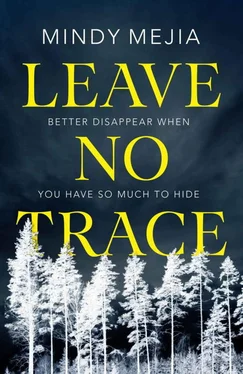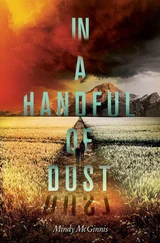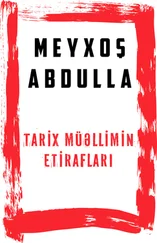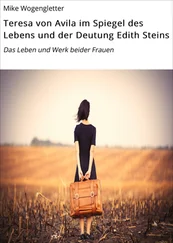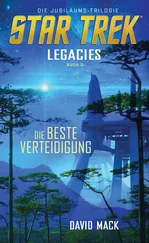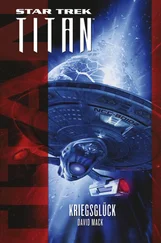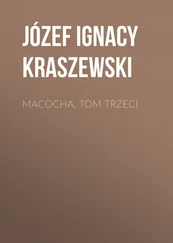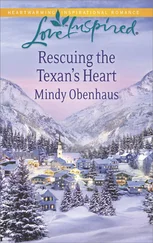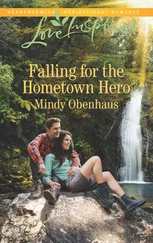When we got back to the canoe, I saw a second boat was also stored under the giant pine. Lucas tied the two together, cut the rope on the stretcher, and lifted Josiah into the bottom of the trailing canoe, propping him against the yoke while I tucked blankets around him.
We set off in the opposite direction from the way we came, Lucas powering the entire caravan while I broke up the layer of ice that had formed overnight. Eventually the river opened up into a wide, island-dotted lake, frozen over at the edges but still navigable. We paddled out to the center and passed an island on which a campsite came into view. Two men stood on the ice next to a packed canoe, clearly preparing to leave. Even from several hundred feet away, I could see it was the Forest Service rangers.
For a moment everything stopped. Lucas quit paddling and the four of us stared at each other across the water, waiting for someone to make a first move. Then the slapping noise of rope hitting water cut through the morning air, and Lucas and I both turned to see Josiah’s canoe unmoored and drifting away. He crouched unsteadily, holding the gunwales for support, and in one of his hands was Harry’s knife.
Lucas paddled backward, shoving bucketfuls of water with each desperate stroke. Josiah’s mouth moved, but I couldn’t hear what he was saying. He straightened up, standing precariously as the canoe shuddered and rocked, and lifted a hand to uncover his head. Strands of thin, gray hair fluttered in the breeze, the growths on his neck bulged unnaturally, but it was his smile that overtook that moment, his sublime gratitude as he surveyed everything around him: the dark water, the solemn white pallbearers of the trees, the land that had harbored him and his son, and then – lifting his face – the perfect, endless sky stretching above, that infinite wilderness into forever. He looked back at Lucas one last time with the unmistakable words forming on his lips – I love you – then turned away from us, sliced his throat open, and fell into the lake. Lucas leaped from the canoe and began swimming desperately toward him, but by the time he reached the other boat, the lake had already taken Josiah, pulling him down into the shadows, leaving no trace.
Maybe our parents are only ever ideas in our heads, poorly enacted by the people who brought us to life. It’s unbearable, what we heap upon them, almost as unbearable as what they see in us. All we can do is hope the bonds tying us together are stronger than those constructs, outlasting our delusions and our failures, maybe even our lives. I talk to my mom in the cabin sometimes. I bring her specimens of minerals and I’ve begun building her a rock garden with her agate in the center, down by the water’s edge where the wildflowers bloom in the summer. Maybe I’m crazy for living in the house where my mother committed suicide, talking to her ghost, and finding her in pieces of basalt littered over the country. Maybe I’m more unstable than the mental health patient I fell in love with. I don’t think it matters anymore, which side of the line we walk, now that Lucas and I have decided to try to walk together.
There are some places, though, we can only go alone. Lucas now has permits to enter the Boundary Waters and sometimes he’ll disappear for a few days or even a few weeks at a time. The Forest Service rangers took down the Blackthorns’ burrow and removed any trace of their habitation, but I don’t know if Lucas even returns there when he paddles or snowshoes in. He never tells me when he’s leaving. I’ll wake up in the morning and his side of the bed will be empty, as if he never existed. I imagine he goes to the lake, the lake we don’t paddle through, where something of Josiah maybe still lingers. And I let him leave, accepting every little abandonment as my penance, because there are places I have to endure alone, too.
He’d been so busy breaking camp that morning, packing what we needed and planning the details of our journey, consumed by the hope that his father might be able to recover if we found help fast enough. Neither of us knew when Josiah stole the knife – we’d confirmed the details of the morning to the authorities and to each other – but what I never told anyone was that I saw it later. As we loaded Josiah into the canoe and I tucked the blankets and sleeping bags around his frail body, I caught sight of Harry’s gift clutched in Josiah’s hand. All the disarming techniques from Congdon flew through my fevered brain and even with an infection storming inside my body I knew I could overpower him, but I didn’t. I did nothing. I crouched over him as he jerked the blade under the cover of the blankets and we stared at each other, the sick and the dying, until he gave me a weak nod.
‘You take care of each other,’ he whispered and we both looked at Lucas’s back as he tested the connection between the canoes, making sure he could keep his father close and protected. With shaking fingers, I tucked the blanket loosely over the knife he’d concealed, and laid my hand on top of it, blessing it, giving him the permission his son never could.
‘Take care of my mom.’
He gave me a dark, watery smile, accepting the price of my silence.
Finding Josiah Blackthorn was easy compared to finding my way through this book. I could never have imagined the Blackthorns without hearing the incredible stories of the Lykovs and the Ho Vans, and I will always be grateful to Patty Loew for pointing me in the right direction. Thank you to Angela Mejia for her wonderful knowledge of and love for Duluth. Thank you to Tara and Andrew Griffin for their medical expertise and preference for liver punctures. I’m grateful for my fellow Boundary Waters voyagers, Amy Anderson and Michelle Thorsness, who hang a mean bear bag and understand the importance of wine. Thank you to Virginia, Steve, and Kathleen at the Spirit of the Wilderness outfitters for all their Boundary Waters and Ely wisdom. Thank you, Sean Montgomery, for getting tased and telling me all about it. Thank you to Philip Mejia, who knows the best way to sabotage cars, and to Sergeant Brandon Howard, who knows the best way to take down a suspect. For their endless support and encouragement, thank you to Tom, Linda, Mya, Liz, Marc, Kristen, Nick, Melonie, Doc, and Godo.
I’m indebted to the research and subject matter authority I found in Lake Superior Rocks & Minerals by Bob Lynch and Dan R. Lynch, A Year in the Wilderness: Bearing Witness in the Boundary Waters by Amy and Dave Freeman, Assessment in Speech-Language Pathology (3rd Ed) by Kenneth G. Shipley and Julie G. McAfee, and Julius F. Wolff Jr’s Lake Superior Shipwrecks . I must also thank the Loft Literary Center, in whose writing studios part of this novel was born.
This book would not have found its way into the world without The Gernert Company and Emily Bestler Books. Thank you to Stephanie Cabot, my incredibly generous and visionary agent, as well as Ellen, Will, Anna, and the whole Gernert team. Thanks are simply not enough for Emily Bestler, who saw past what I was writing and guided this book back to its Northwoods home, and I’m forever grateful for the hard work of Lara, David, and everyone who creates the Emily Bestler Books magic. I would be remiss if I didn’t also thank Jane Wood and Therese Keating at Quercus for their invaluable feedback through multiple revisions.
Finally, at the heart of it all is Rory, who said she’d follow me into a house. She’d follow me into the wilderness. Wherever I was, she wanted to be. Rest easy, little girl. We aren’t burying any bodies yet.
We hope you enjoyed Leave No Trace

If you’d like to read more by Mindy Mejia
buy The Last Act of Hattie Hoffman now
Читать дальше
